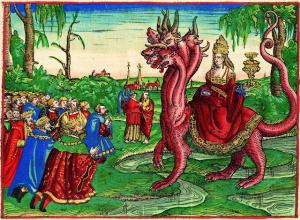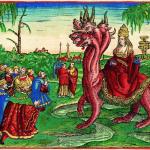Asking Patron Saints to Intercede; Miracles Among Catholics & Protestants
The late Steve Hays (1959-2020) was a Calvinist (and anti-Catholic) writer, who was very active on his blog, called Triablogue (now continued by Jason Engwer). His 695-page self-published book, Catholicism — which appears to simply be a collection of his articles on his site — has graciously been made available there for free. This is one of many planned critiques of that book. Rather than list them all in individual sections, interested readers are directed to the “Steve Hays” section of my Anti-Catholicism web page, where they will all be listed. My Bible citations are from the RSV. Steve’s words will be in blue.
*****
[Chapter 1: Miracles]
Anthony, don’t pray for me [p. 11: subtitle]
[Francis] Beckwith prays to the patron saint of cancer patients on behalf of a cancer patient, who nevertheless dies shortly thereafter. How does that validate St. Anthony’s reputation as a long-distance healer? If the patient was cured, that would be impressive. But since the patient succumbed, that hardly furnishes supporting evidence for Anthony’s reputation. [p. 11]
Unanswered prayer no more disproves the practice of asking patron saints to intercede to God than it disproves prayer to God Himself when He says “no.” And that’s because God may always will not to answer a prayer, for reasons usually known to Him alone. This is an explicitly biblical doctrine:
1 John 5:14 And this is the confidence which we have in him, that if we ask anything according to his will he hears us.
James 4:3 You ask and do not receive, because you ask wrongly, to spend it on your passions.
James 1:7-8 For that person must not suppose that a double-minded man, unstable in all his ways, will receive anything from the Lord.
James 5:16 . . . The prayer of a righteous man has great power in its effects.
Hebrews 10:22 let us draw near with a true heart in full assurance of faith, with our hearts sprinkled clean from an evil conscience and our bodies washed with pure water.
Psalm 66:18 If I had cherished iniquity in my heart, the Lord would not have listened.
Proverbs 15:8 The sacrifice of the wicked is an abomination to the LORD, but the prayer of the upright is his delight.
Isaiah 1:15 When you spread forth your hands, I will hide my eyes from you; even though you make many prayers, I will not listen; your hands are full of blood. (cf. Jer 11:11)
Isaiah 59:2 but your iniquities have made a separation between you and your God, and your sins have hid his face from you so that he does not hear.
Even St. Paul’s petitionary prayer request was expressly turned down by God:
2 Corinthians 12:7-9 And to keep me from being too elated by the abundance of revelations, a thorn was given me in the flesh, a messenger of Satan, to harass me, to keep me from being too elated. [8] Three times I besought the Lord about this, that it should leave me; [9] but he said to me, “My grace is sufficient for you, for my power is made perfect in weakness.” I will all the more gladly boast of my weaknesses, that the power of Christ may rest upon me.
The prophet Jonah prayed to God to die (Jonah 4:3): “Therefore now, O LORD, take my life from me, I beseech thee, for it is better for me to die than to live.” (cf. 4:8-9). God obviously didn’t fulfill the request, and chided Jonah or his anger (4:4, 9). The prophet Ezekiel did the same: “O LORD, take away my life” (1 Kgs 19:4). God had other plans, as the entire passage shows. If we pray something stupidly, God won’t answer. He knows better than we do.
Jesus also tells the story (not a parable, which don’t have proper names) in Luke 16 of Lazarus and the rich man, in which two petitionary requests (in effect, prayers: 16:24, 27-28, 30) to Abraham are turned down (16:25-26, 29, 31). Since Jesus is teaching theological principles or truths, by means of the story, then it follows that it’s His own opinion as well: that prayers are not always answered. They have to be according to God’s will.
It’s like “evidence” for global warming. If there’s a warming trend, that’s evidence for global warming–but if there’s a cooling trend, that’s consistent with global warming. Whether it’s wetter or drier, that’s evidence for global warming. If either outcome is consistent with St. Anthony’s reputation, then does anything really count as evidence for or against his reputation? Or is it just random? [p. 11]
The attempted analogy doesn’t apply here because of the important and central additional factor of prayer being conditional upon it being God’s will, just explained.
v) Assuming (ex hypothesi) that it’s a miracle, what kind of miracle would it be? Not like turning water into wine or the multiplication of food. Rather, this would be a coincidence miracle. A result of God’s extraordinary providence.
That, however, is very predestinarian. That assumes God prearranged ordinary circumstances to converge on this opportune and naturally improbable outcome. If so, that’s inconsistent with the libertarian strand of Catholic theology (e.g. Jesuit theologians). [p. 11]
This is another caricature of Catholic theology. We believe in God’s providence as much as any Calvinist does, and we believe in the predestination of the elect and of whatever events God chooses to be predestined. Where we disagree is over the predestination of the damned. We deny that; Calvinists affirm it. Nor is predestination in the slightest incompatible with Jesuit theology (Molinism and suchlike: which happens to be my own view). Jesuits, being Catholics, accept predestination like the Thomists and any other Catholics. They simply have a different view of its implementation or operation by God and precisely how human free will is related to it.
vi) Assuming (ex hypothesi) that it’s a miracle, does it validate the cult of the saints? [p. 11]
If it happens enough times, yes, just as in the case of any other miracle. It validates and suggests this, while not absolutely proving it.
Not unless you think the only function of a miracle is to attest doctrine. Moreover, that’s offset by Protestant miracles. [p. 11]
That’s neither here nor there. If something happens enough times, and suggests that “x caused miracle y,” then that is cumulative evidence for x indeed being the cause or a contributing cause of y. Protestants experience miracles because they are incorporated into the Body of Christ by virtue of the regeneration of their baptism, which is a true sacrament. So declared Trent (i.e., this is nothing new).
Again, prayers of this sort (distinctively Catholic prayers) are substantiated to the extent that they appear to be answered again and again: precisely as with prayers directly to God. It’s difficult to absolutely prove anything regarding prayer, but we can only look to patterns in cause and effect, suggesting “success” or “failure.” Atheists reject all Christian prayers; anti-Catholics take a very dim — if not outright hostile — view of Catholic prayers. What else is new?
Ecclesiastical miracles [p. 15: subtitle]
Unlike the schismatic Protestant sect, Rome is verifiably the one true church because she enjoys miraculous attestation. So goes the argument. One problem with this claim–a problem which has become more manifest since the Reformation–is the fact that Rome doesn’t enjoy a monopoly on reported miracles. There are reported Protestant miracles as well as reported Catholic miracles. Therefore, even if we grant for the sake of argument that Catholicism enjoys prima facie miraculous evidence, the same holds true for Protestantism. [p. 15]
What Hays doesn’t do is comment on the relative numbers of miracles. I contend that we experience many more, relative to Protestantism (and we freely acknowledge that miracles occur among Protestants, as already alluded to). It helps us to have more miracles, seeing that many Protestants don’t even believe that they occur anymore, either due to lack of faith and a full belief or false and unbiblical theological premises regarding miracles (cessationism or Hays’ own semicessationism).
Catholics even have many entire categories of miracles that we believe in, whereas most Protestants don’t: such as exorcisms (discussed in reply #1), incorruptible bodies of saints (a phenomenon that Protestants have the most difficult time trying to explain, leading most of them to simply avoid the topic like the plague), weeping statues of Mary, eucharistic miracles, Marian apparitions, the stigmata, living on the Eucharist alone, levitation, bilocation, etc. We even believe in ghosts, unlike a great many Protestants, who collapse all such occurrences to the horrible and utterly forbidden occult, seances, sorcery, necromancy, etc.
C. S. Lewis (quite Protestant) wrote about seeing the ghost of his wife, Joy, in his book, A Grief Observed. He didn’t feel the need to rationalize this away as a demon impersonating her, etc. Several incidents in the Bible involve dead people coming back to earth (e.g., the prophet Samuel, the two witnesses of Revelation, those who come out of their tombs after the crucifixion, Elijah and Moses at the Transfiguration, etc.).
My point is not to vouch for any particular claim, but just to make the fairly obvious observation that this fixture of the traditional apologetic for Roman Catholicism now backfires. We can call your reputed miracles and raise you. [p. 15]
Not at all, as just explained. Our claims for miracles never had anything to do with whether Protestants also have miracles in their midst. Baptismal regeneration is a miracle, so is initial justification and being filled with the Holy Spirit and the sacrament of matrimony: things that happen to Protestants by the hundreds of millions. It’s a non-issue for us. But if we want to talk about quantities of miracles and many more categories of them, Catholics “win” hands down.
***
Practical Matters: Perhaps some of my 4,200+ free online articles (the most comprehensive “one-stop” Catholic apologetics site) or fifty-one books have helped you (by God’s grace) to decide to become Catholic or to return to the Church, or better understand some doctrines and why we believe them.
Or you may believe my work is worthy to support for the purpose of apologetics and evangelism in general. If so, please seriously consider a much-needed financial contribution. I’m always in need of more funds: especially monthly support. “The laborer is worthy of his wages” (1 Tim 5:18, NKJV). 1 December 2021 was my 20th anniversary as a full-time Catholic apologist, and February 2022 marked the 25th anniversary of my blog.
PayPal donations are the easiest: just send to my email address: [email protected]. You’ll see the term “Catholic Used Book Service”, which is my old side-business. To learn about the different methods of contributing, including 100% tax deduction, etc., see my page: About Catholic Apologist Dave Armstrong / Donation Information. Thanks a million from the bottom of my heart!
***
Photo credit: The Whore of Babylon (workshop of Lucas Cranach): colorized illustration from Martin Luther’s 1534 translation of the Bible [public domain / Wikimedia Commons]
***
Summary: The late Steve Hays was a Calvinist and anti-Catholic writer and apologist. This is one of my many critiques of Hays’ “Catholicism”: a 695-page self-published volume.













